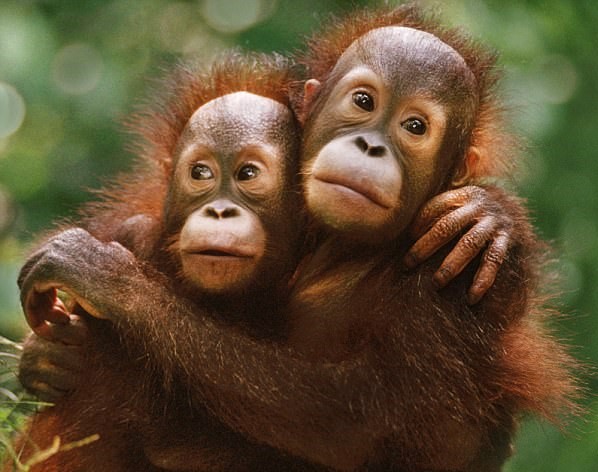The issue of illegal burning and deforestation to produce palm oil, is often in the media. But did you know those images of sad-eyed orangutan orphans are linked to the use of cleaning products?
Of the 58 million tons of palm and palm kernel oil produced each year, up to 10% is used to make soaps, detergents and other consumer products. So, when we make, sell or buy cleaning products, we are all partially responsible.
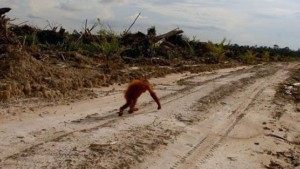
What is the problem with palm oil?
When virgin rainforests are cleared to make way for palm plantations, it destroys the vital habitat for endangered species like orangutans, elephants and tigers, and its indigenous population.
According to the BOS foundation, up to 80% of suitable forest in Indonesia and Malaysia having been lost in the past 20 years. Most recent estimates indicate that around 15,000 Sumatran orangutans and 57,000 Bornean orangutans survive in the wild today and an estimated loss of between 3,000 and 5,000 orangutans every year.
Instead they urge us to support small-scale farmers and encourage them to leave sufficient habitat between plantations to support orangutans, by buying products made from sustainably-produced palm oil. But how can we tell which products contain palm oil and whether this destroyed orangutan habitat or not?
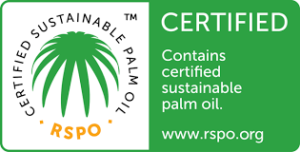
Certified Sustainable Palm Oil
In 2004, the Roundtable on Sustainable Palm Oil (RSPO) was formed between industry, investors, retailers and Non-Government Organisations (NGOs), with the objective of ‘promoting the growth and use of sustainable oil palm products through credible global standards and engagement of stakeholders’.
RSPO drew up eight principles for sustainable palm oil that would prevent forest fires and protect the local people and wildlife. Oil produced to these principles can be certified by RSPO as Certified Sustainable Palm Oil (CSPO).
Manufacturers of products containing palm oil, such as detergent, can become signatories to the RSPO, which enables them to buy responsibly-grown palm and palm kernel oil from RSPO certified farmers. Eco-label standards such as Good Environmental Choice Australia (GECA) also require RSPO certification if Palm Oil is an ingredient in a certified cleaning product.
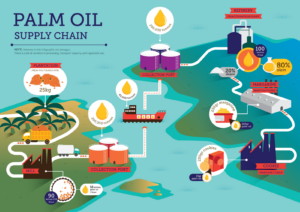
Burning issues
So with global agreements and growing consumer demand for certified palm oil, why do we still have a problem? Although many big firms (timber as well as palm oil) have signed zero-deforestation pledges, and Indonesia has banned deforestation, it is proving extremely difficult to control practices carried out over vast and remote forested regions. For example, once a ‘slash and burn’ operation has cleared the trees, the peat continues to burn underground, making it hard to extinguish and identify its source.
In a bid to improve the monitoring and enforcement of its rules, in early 2017 I wrote that the RSPO had announced that it will publish digital maps of all its members’ palm oil concessions to improve transparency and alleviate growing concerns about its effectiveness.
But working with multiple stakeholders, countries and Governments is clearly very slow work. Only in December 2019, almost 3 years later, have the RSPO announced they have been given the greenlight from the Malaysian Government to publish these maps.
Which is good news because the alternatives to palm oil may even be worse.
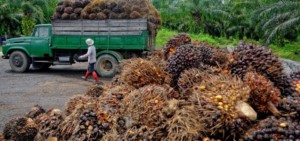
Why is palm oil so important?
Should we avoid products with palm oil then? While this is a personal decision that many have come to, this is a complex problem and many organisations such as the World Wildlife Fund (WWF) say a ban could actually make the problem worse.
Palm trees produce four to ten times more oil per metre of cultivated land than other oil crops, such as sunflower, soybean or rapeseed oil. So banning palm oil could actually lead to even more forests being converted into agricultural land.
An estimated 4.5 million people who earn their living from palm oil production would need to find some other way to support their families and communities or return to poverty.
The smooth texture of palm kernel oil used to produce detergent is not easily or cheaply replicated. So if RSPO Certified industries are not supported by consumers, the oil will still be produced but without checks or incentives in place, and the efforts of the International community could be reversed with devastating results.
How to buy sustainably-sourced cleaning products
Although the palm oil story is happening overseas, we can make a difference in Australia through our purchasing decisions. Unfortunately, this is also frustratingly difficult. While some NGOs such as the Palm Oil Action Group have produced lists of Palm Oil free consumer products, I found no lists of RSPO Certified for cleaning products and there is no legal requirement for Palm Oil disclosure on consumer labels.
As with many environmental concerns, the best way to ensure you are not adding to the palm oil problem is to purchase either:
- Detergent that are certified against Standards that require RSPO Certification, such as GECA Cleaning Products Standard (CPv2.2ii-2012) or
- Chemical-free cleaning technology.
By supporting the farmers and manufacturers who are RSPO Certified, you are helping to sustain the forests that Sumatran tigers, elephants and orangutans need to survive.
Other ways you can help:
Why don’t you and your company consider committing to support the work done by organisations trying to save orangutans from extinction, such as:
- Adopt an orangutan through The Orangutan Project
- Or donate to save the vital orangutan habitat in the “Thirty Hills” in Sumatra
- Or support Greenpeace
About the author:

Bridget Gardner is Director and Principal Consultant of HPC Solutions (formerly Fresh Green Clean).
This article was first published in Inclean Magazine, March 2017.

